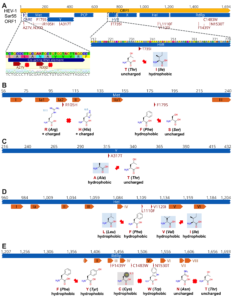Hepatitis E virus (HEV) infection in pregnant women has a high incidence of developing fulminant hepatic failure (FHF) with significant mortality. Multiple amino acid changes in the genome of HEV-1 are reportedly linked to clinical cases of FHF, but experimental confirmation of the roles of these changes in FHF is lacking.
A study led by Dr. Bo Wang and Prof. Xiang-Jin Meng from the Virginia Polytechnic Institute and State University, USA, comprehensively analyzed eleven FHF-associated HEV mutations in silico and in vitro and investigated the effect of these mutations on replication efficiency and infectivity of both HEV-1 and HEV-3. They determined the precise location and epidemiological prevalence of all FHF-associated mutations in distinct HEV genotypes. By utilizing the HEV-1 indicator replicon and infectious clone, they demonstrated that most of the mutations actually impaired HEV-1 replication efficiency compared with the wild-type virus, likely due to altered physicochemical properties and structural conformations. However, two mutations, A317T and V1120I, significantly increased HEV-1 replication. Notably, these two mutations simultaneously occurred in 100% of 21 HEV-1 variants from patients with FHF in Bangladesh. They further showed that an HEV-1 A317T/V1120I double mutant greatly enhanced HEV replication, which may explain the rapid viral replication and severe disease. Furthermore, they tested the effect of these FHF-associated mutations on HEV-3 replication and found that all the mutants had a reduced level of replication ability and infectivity, which is not unexpected due to distinct infection patterns between HEV-1 and HEV-3. Additionally, they demonstrated that these FHF-associated mutations do not appear to alter their sensitivity to Ribavirin, suggesting that Ribavirin remains a viable option for antiviral therapy for patients with FHF.
These findings provide direct experimental evidence that two FHF-associated HEV-1 mutations may potentially link to rapid viral replication and FHF in endemic regions. The results have important implications for understanding the mechanism of HEV-1-associated FHF.

This study was published in Proc. Natl. Acad. Sci. USA. 2022; 119 (34) e2207503119. Read the full research article https://doi.org/10.1073/pnas.2207503119.

